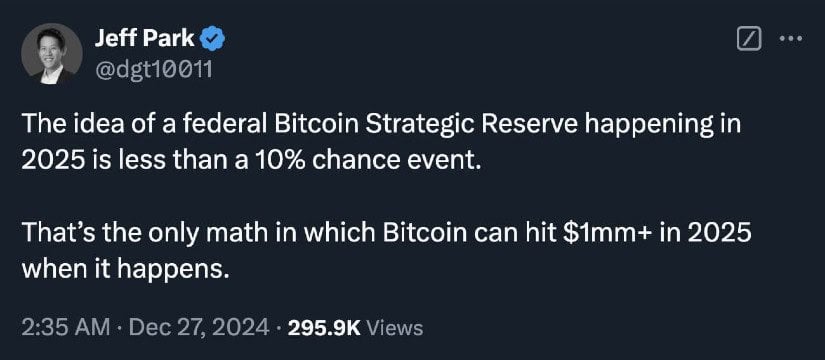[ad_1]

Bitcoin’s historic climb above the $100,000 mark this year has ignited fresh debate over where the world’s largest cryptocurrency could be headed in 2025. Some analysts anticipate a continued surge, pointing to new U.S. leadership and booming institutional interest in crypto as catalysts. Others warn that regulatory and macroeconomic uncertainties could temper the bullish momentum.
Below is a roundup of key expert views on where Bitcoin might be headed next year and why.
Trump Administration Shifts Tone on Crypto
The U.S. presidential election this past November put Bitcoin back in the spotlight. President-elect Donald Trump has floated the idea of establishing a “Strategic National Bitcoin Stockpile” and tapping crypto advocate Paul Atkins to head the Securities and Exchange Commission (SEC). Trump’s stated openness to digital assets has bolstered optimism among crypto proponents, but market watchers note that details remain scarce.
“Trump’s stance on [decentralized finance (DeFi)] and crypto has been somewhat inconsistent,” said Sarah Brennan, General Counsel at Delphi Ventures. “While he has expressed interest in the space, much of his focus seems limited to supporting dollar dominance and real estate applications.”
Analysts say a friendlier regulatory environment could spur further Bitcoin adoption. Yet uncertainty lingers, and some caution that promised reforms could be delayed or watered down in practice.
Bitcoin Could Hit $200,000 – or Even More
Multiple investment firms project that Bitcoin’s price may climb into six-figure territory again in 2025, citing rising institutional demand and the continued effects of the cryptocurrency’s halving cycle, which reduces the pace of new coin issuance every four years.
- Bitwise analysts predict the token could top $200,000 by the end of 2025, driven partly by the influx of spot bitcoin exchange-traded funds (ETFs).
- VanEck analysts estimate a slightly lower figure of around $180,000, but they foresee wide price swings, including a possible mid-year correction before a rebound.

Source: Bitwise
Jeff Park, Head of Alpha Strategies at Bitwise, has floated the possibility of a $1 million Bitcoin price—though only if the U.S. government formally creates a strategic reserve. “That’s the only math in which Bitcoin can hit $1mm+ in 2025,” he said in a social media post, assigning about a 10% probability to that scenario.
Institutional flows remain a central pillar of these predictions. According to several market reports, spot Bitcoin ETFs have already attracted billions of dollars in inflows, and that figure could grow if additional fund providers secure regulatory approval.

Source: X
Halving Cycle’s Historical Boost
Bitcoin’s halving in 2024—reducing miners’ block rewards from 6.25 BTC to 3.125 BTC—has historically coincided with extended price rallies, including the latest surge above $100,000. Some experts expect a similar pattern next year, although bigger players in the market could limit sharp downturns.
The presence of large companies and asset managers, analysts say, may mean a less volatile cycle than in previous years. But others argue that the market could still face periodic corrections, particularly if the Federal Reserve tempers interest rate cuts or macroeconomic conditions turn less favorable for risk assets.
Will Altcoins Catch Up?
Bitcoin’s dominance in the crypto market has climbed to multi-year highs, raising questions about whether altcoins can replicate BTC’s success. Institutions have already filed applications for ETFs based on other cryptocurrencies, such as XRP and ether, though approvals are uncertain.
“Historically bitcoin dominance has been cyclical,” said Seth Ginns, Managing Partner and Head of Liquid Investments at CoinFund. “We’d expect a handoff to alts once bitcoin gets meaningfully above its all-time high, as happened in the last cycle.”
At the moment, altcoin valuations remain mixed, and some traders say they need clear regulatory greenlights and stronger use cases before attracting a wave of fresh capital.
Regulation Remains a Wild Card
With SEC Chair Gary Gensler set to step down, industry participants are hoping for what they call “clear, constructive” guidelines around stablecoins, token classifications, and market structure. Congress has signaled interest in crafting legislation that clarifies which cryptocurrencies fall under commodity or security laws, though progress has been slow.
A legislative push to recognize stablecoins and define crypto market oversight could come first, according to Nic Carter, Partner at Castle Island Ventures. Broader reforms, he said, will likely follow once stablecoin rules are in place.
Outlook for 2025
Experts agree that Bitcoin has gained significant traction this year—surpassing $100,000 for the first time—on the back of institutional adoption and anticipation of a crypto-friendly U.S. administration. While some forecast a run to $200,000 or higher, skeptics note that global macro factors could undermine bullish sentiment.
Still, the consensus is that 2025 will be anything but quiet for the flagship digital asset. Whether propelled by new U.S. regulation, broader corporate demand, or potential government stockpiling, Bitcoin’s price appears poised for another eventful chapter in its volatile, decade-long story.
[ad_2]






